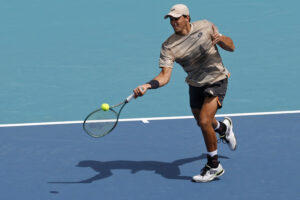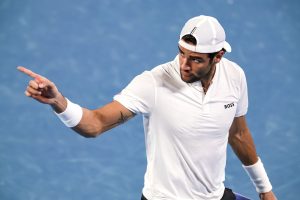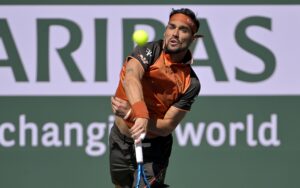Roger Federer has announced he will retire from professional tennis.
After over 40 years on the planet and two knee surgeries, the Swiss Maestro has finally decided to hang up his racket. He’s brought the tennis world heaps of entertainment, tears of joy, tears of heartache, moments of artistry and immortal matches that will go down in the annals of history.
To do what little we can to pay him back, we’ve made a list of the crowning achievements from every year of Federer’s 25-year long career
Early Years (1996-1999)
1996: First Senior Win
At the tender age of 15, Federer tried his hand at a few Futures events in Switzerland, winning his first senior match in a qualifying draw against Kazushi Takeshita of Japan.
1997: First International Junior Title
Though he was only 16, Federer started to win more regularly at Futures events. At the Junior level, he won his first International title, defeating Luka Kutanjac in Prato.
1998: Junior Wimbledon Champion
1998 was the year Federer became part of the conversation. He won a couple of Futures titles in Switzerland but, more importantly, he won the Wimbledon Junior’s title and the Orange Bowl. Having won a couple of matches at ATP-level, against Guillaume Raoux and Richard Fronberg, Federer was looking to take the next step.
1999: Youngest Player in Top 100 and first Challenger Title
Federer ticked a few career milestones off his list in 1999. He won his first and only Challenger title in Brest (he only played eight events at Challenger level in his career!) and made his Grand Slam debut at the French Open, honorably losing in four sets to Pat Rafter. He also defeated his first Top 10 player in Carlos Moya at the Marseille Open. The wins mounted up and he made his Top 100 debut, the youngest player there at 17 years old. He dropped out for a single week and entered again on 11/10/1999, then holding the record to date at 1120 consecutive weeks.
Early Success (2000-2003)
2000: First Tour-Level Final
In 2000, Federer cemented his place in the Top 100 as he began to find success at higher level tournaments. He reached his first ATP finals in Marseille and Basel, narrowly earning himself a spot int he world’s top-30.
2001: First Title and Dethroning of Sampras
Though Federer won his first Tour-level title in Milan in 2001, this wasn’t his crowning achievement of this year. In the fourth round of Wimbledon, Federer defeated Pete Sampras, the four-time reigning champion. If the world hadn’t noticed Federer before, they did now.
2002: Masters Success
Though he didn’t find success at the Slams, 2002 was the year Federer established himself as a top contender. Federer won his first Masters title in Hamburg, defeating Marat Safin in the final with ease, and earned his first victory against a world #1, defeating Lleyton Hewitt in the Miami Masters semifinals.
2003: First Grand Slam Title
2003 was the year Federer made his first step towards legendary status. Federer won his first Grand Slam title at Wimbledon, defeating Mark Philippoussis in straight sets. This gave Federer a new lease of life in finals, winning his next 24 before losing to David Nalbandian at the 2005 ATP Tour Finals.
Golden Years (2004-2010)
2004: The Best Player in the World
In 2004, Federer went from contender to the man to beat. He won three of the four Grand Slams, became world #1 for the first time and won his first year-end Championship. Not bad… but Federer was just getting started.
2005: Best Season Win-Percentage
Though Federer could only win a measly two Slams, defending his Wimbledon and US Open titles, he won 81 of the 85 matches he played in 2005. At 95.3%, this is the best season win-percentage of Federer’s career and is third only to John McEnroe and Jimmy Connors.
2006: Statistically Best Season
If the last two years had been exceptional, 2006 was a god-tier season. Federer’s only Grand Slam loss came to Rafael Nadal in the French Open final, he won four of the six Masters tournaments he entered and he won the year-end Championship. Federer’s tally of 12 titles won is his highest in a single season and, given the calibre of tournaments he won, statistically makes 2006 the best season of his career.
2007: Third Year Winning Three Grand Slams
In 2007, Federer posted a third year winning three Grand Slams, the joint most years to achieve this in the Open Era (matched by Novak Djokovic), falling to Nadal once again at the French Open. In doing so, Federer went a third consecutive year ranked #1 in the world for the entirety of the season, a record that remains unbroken to date. Federer also reached his 10th consecutive Grand Slam final at the US Open, the longest streak in the Open Era.
2008: Longest Winning Streak on Grass
In 2008, Federer lost to Rafael Nadal in one of the most iconic Wimbledon finals in history. This ended a 65-match win streak on grass which dated back to Halle in 2003, the longest grass-court win streak of the Open Era. Federer’s record of 237 consecutive weeks at #1 also came to an end, another record he still holds to this day. This was the final year Federer won the US Open, ending a streak of five consecutive titles.
2009: Career Grand Slam
After Nadal lost to Robin Soderling at the French Open in 2009, Federer saw his opportunity. He survived scares against Tommy Haas and Juan Martin Del Potro before conquering Nadal’s conqueror in the final to win his sole French Open title, joining a prestigious list of players in achieving the career Grand Slam. He also reached all four finals that season – this was the third year that Federer had achieved this, the most years in the Open Era.
2010: Most Consecutive Grand Slam Semifinals
2010 was a less-than-perfect year for Federer, who could only add one Slam to his name at the Australian Open. He would fall before the semifinals at the French Open, ending a streak of 23 consecutive Grand Slam semifinals… you guessed it, a record that’s been unbeaten to date.
Changing of the Guard (2011-2016)
2011: Most World Tour Final Titles
Though this year was somewhat of a changing of the guard, Federer was still in formidable form and added a few records to his resumé. In reaching the Paris Masters final, Federer became the first man to reach all nine Masters finals (now joined by Djokovic and Nadal). At the World Tour Finals, Federer won his sixth title, the most in the Open Era, also making him the oldest champion to date at 30 years and three months old.
2012: A Man of all Surfaces
Federer won his 10th title on clay at the 2012 Madrid Open against Tomas Berdych. In doing so, Federer became the only man to have won at least 10 titles on clay, grass and hard surfaces in the Open Era. His seventh Wimbledon title ended a drought of two and a half years without winning a Grand Slam title.
2013: Most Consecutive Grand Slam Quarterfinals
Said to be his bogey year, 2013 marks the conclusion of one of the greatest achievements of Federer’s career. In falling to Sergiy Stakhovsky in Wimbledon’s second round, Federer’s run of 36 consecutive Grand Slam quarterfinals came to an end (Novak Djokovic is second with 28). This run dates all the way back to Wimbledon 2004. If ever there was a stat to highlight Federer’s consistency, this is it.
2014: Davis Cup Glory
For all of Federer’s wins throughout his career, he hadn’t quite delivered for his country (if you don’t count his victory in the Olympic doubles with Stan Wawrinka in 2008). He’d lost to Lleyton Hewitt in the 2003 Davis Cup semifinals and had fallen to Andy Murray at the last hurdle at the 2012 Olympics. In 2014, however, he played a crucial part in Switzerland’s first Davis Cup title, winning the doubles tie with compatriot Wawrinka and defeating Richard Gasquet in the singles.
2015: Most Cincinatti Masters Titles
Though the year was heavily dominated by Novak Djokovic, Federer had a real moment of glory at the Cincinnati Masters. Federer toppled the World #1 in the final, extending his record to seven Cincinnati Masters titles and winning his second title there without having his serve broken or losing a set. Both records are unmatched to date.
2016: Most Consecutive Wins at ATP-500 level
Federer was forced to end his season early due to a knee injury but was still able to break a record before bowing out. Though Federer lost to Zverev in the semifinals of Halle, his three wins earlier that week made it 28 consecutive wins in a row at ATP 500 level, surpassing Rafael Nadal’s previous record of 26.
Resurgence (2017-2019)
2017: Most Wimbledon Titles
Potentially the last great year of an even greater career, the most obvious record broken this year was Federer’s eighth Wimbledon title, surpassing Sampras’s count of seven. Earlier that year, coming back from surgery, he also won in Australia, defeating four top-10 opponents in one Grand Slam (matched by Vilas, Borg and Wilander). It also marks Federer’s sixth year with a match-winning percentage of over 90%, more years than anyone else in the Open Era.
2018: Most Grand Slam Titles and Oldest #1
The 2018 Australian Open was the last Grand Slam to be added to Federer’s CV and, at the time, it marked a record 20 Grand Slam titles won for the Swiss, since surpassed by both Nadal and Djokovic. This tournament was crucial in Federer becoming the oldest #1 in history at 36 years, 320 days old.
2019: Oldest Masters Champion
The Wimbledon final is likely to cloud the memories of 2019 for many Federer fans (his 31st Grand Slam final, an Open Era record). This is a shame as, earlier that year, Federer achieved one of his most undervalued records–he won the Miami Masters at 37 years and seventh months old, becoming the oldest Masters 1000 champion in history (Nadal is the second oldest at 34 years and 11 months). He was also able to win his 10th titles in Halle and Basel, his most titles at one tournament, and his last two titles won, increasing his tally to 103 singles titles (second only to Connors at 109).
Decline (2020-2021)
2020: Most Semifinals at a single Grand Slam
A quiet year for Federer as his season was curtailed by COVID and a knee surgery. Nonetheless, the great Swiss found time at the start of the year to reach his 15th Australian Open semifinal–at the time, this stodd as the most semifinals made at a single Grand Slam (Nadal has since surpassed that with 15 semifinals at the French Open).
2021: Most Grand Slam Quarterfinals
Still playing tennis, still extending records. In 2021, despite playing on one leg, Federer defeated Lorenzo Sonego to make his 58th career Grand Slam quarterfinal and win his 369th Grand Slam match (both records), eventually going down to Hubert Hurkacz in straight sets. Though Federer arguably should have retired mid-match, he continued to the end, suffering only the fifth bagel set of his career and keeping his flawless record of no career mid-match retirements intact.
Miscellaneous (All Years)
Finally, here are a few career achievements that didn’t quite fit a single year of Federer’s career.
- Four winning streaks of 25+ matches (unmatched).
- Two winning streaks of 35+ matches (matched by Borg and Connors).
- Most tiebreaks won in the Open Era at 466.
- Most consecutive match victories vs top 10 opponents at 24.
- Highest career tiebreaks won percentage at 65.36%.
- Most Grand Slam appearances of the Open Era at 81 appearances overall.
- Titles won in most different countries at 19.
- Most ATPTour.com Fans’ Favourite Awards at 18.
- Most Stefan Edberg Sportsmanship Awards at 13.
What a career! Did we miss anything? Let us know in the comments.
Roger Federer, good luck in the future – not that you’ll need any luck, we have no doubt you’ll excel at whatever you turn your hand to next.
Main Photo from Getty.






